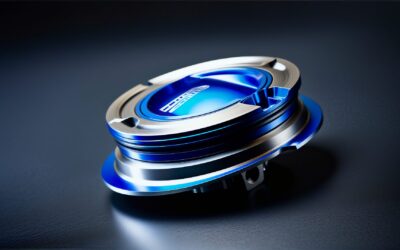When it comes to engine performance, the hidden champion lies within the piston’s molecular structure. While most drivers cruise unaware of their engine’s internal components, the battle between forged and cast pistons has been shaping automotive performance for decades.
The choice between forged and cast pistons isn’t just about durability – it’s a decision that can mean the difference between a reliable daily driver and a track-dominating powerhouse. Understanding these crucial components reveals why professional builders often spare no expense in selecting the right piston for their application.
Manufacturing Methods and Material Properties
Pistons serve as the primary component in engines, converting the energy from combustion into mechanical motion. The manufacturing approach significantly influences their performance and durability.
Forged Piston Production
The forging process begins with aluminum alloy rods cut into precise slugs. These slugs undergo intense heating before being pressed with forces up to 2000 tons. This extreme pressure creates a dense, compact material structure with an aligned grain pattern. The directional grain formation adds structural integrity and strength to the final product.
Cast Piston Manufacturing
Cast pistons take shape through a different method. Manufacturers pour molten metal into specially designed molds, allowing the material to cool and solidify naturally. This technique proves more economical for large-scale production runs and meets the requirements of standard street vehicles.
The manufacturing method directly affects the piston’s material properties:
- Forged pistons display superior strength due to their compressed grain structure
- Cast pistons feature a more random internal grain pattern
- The forging process allows for lighter designs while maintaining durability
- Cast versions offer good performance for everyday driving conditions
For stock engines and regular maintenance schedules, cast pistons provide reliable service. However, high-performance applications and modified engines often require the enhanced durability of forged components.
Performance Characteristics
Strength and Heat Management
Forged pistons stand out in high-stress racing applications like racing and turbocharged engines. Their compressed material structure handles intense pressures better than cast alternatives. Under high temperatures, forged pistons maintain better dimensional stability, while cast versions may show greater expansion rates.
Material Structure Benefits
The directional grain pattern in forged pistons creates a stronger mechanical bond throughout the material. This aligned structure helps resist deformation under stress. In contrast, cast pistons have a scattered grain arrangement, which can limit their ability to handle extreme conditions.
Weight and Efficiency Impact
Forged pistons allow for thinner designs while keeping structural integrity intact. This weight reduction leads to:
- Lower reciprocating mass
- Reduced engine stress
- Better throttle response
- Improved high-RPM performance
The lighter weight of forged pistons decreases inertial forces within the engine, allowing for smoother operation at higher speeds. While cast pistons work well in standard applications, their heavier construction can limit an engine’s potential, particularly in performance-focused builds where every gram matters.
Cast pistons suit daily drivers and stock engines, offering reliable service under normal conditions. However, when pushing an engine’s limits through modifications or racing, forged pistons provide the necessary strength and heat resistance for sustained high-performance operation.
Cost Factors and Economic Impact
Production Expenses
Manufacturing methods create notable price differences between piston types. Forged pistons cost more due to their intensive production process, requiring specialized equipment and precise temperature control. Cast pistons offer lower prices through simpler manufacturing steps and higher production volumes.
Maintenance Economics
The choice between forged and cast pistons affects long-term ownership costs. While forged pistons demand higher upfront investment, they often last longer in high-stress conditions. Cast pistons may need more frequent replacement when used in modified engines, increasing maintenance expenses over time.
Value Considerations
Performance enthusiasts must weigh initial costs against intended use:
- Stock engines benefit from cast pistons’ lower price point
- Racing applications justify forged pistons’ premium cost
- Modified street cars might require forged pistons for reliability
- Professional builds factor replacement intervals into total costs
The price difference between forged and cast pistons reflects their intended applications. Daily drivers rarely need the added strength of forged components, making cast pistons a sound economic choice. However, high-performance builds benefit from forged pistons’ durability, despite higher initial costs. When calculating total ownership expenses, consider both purchase price and expected service life based on engine specifications and usage patterns.
Preferred Applications and Engine Compatibility
High-Performance Settings
Forged pistons work best in demanding environments where standard components might fail. These include:
- Race cars and track-focused vehicles
- Turbocharged and supercharged engines
- High-RPM applications
- Engines producing excessive heat
The increased strength and heat resistance of forged pistons make them essential for modified engines running higher boost levels or aggressive timing.
Standard Vehicle Applications
Cast pistons serve well in:
- Factory stock engines
- Daily driven vehicles
- Standard maintenance intervals
- Lower horsepower applications
Most manufacturers choose cast pistons for production vehicles due to their modern piston manufacturing and acceptable performance in normal driving conditions.
Engine Modification Potential
Piston selection influences an engine’s modification capacity:
- Forged pistons support increased boost pressure
- Higher compression ratios become possible
- Greater RPM limits can be achieved
- More aggressive ignition timing settings
Cast pistons often restrict modification options, limiting boost levels and power gains. When planning engine upgrades, forged pistons provide greater flexibility for future modifications. The choice between forged and cast pistons should align with long-term performance goals and intended vehicle use.
Final Considerations
The debate between forged and cast pistons ultimately comes down to intended use and performance requirements. While cast pistons serve admirably in daily drivers and stock applications, forged pistons stand as the undisputed champions of high-performance environments, offering superior strength, heat resistance, and durability.
For enthusiasts pushing the boundaries of engine performance, the investment in forged pistons isn’t just about premium materials – it’s about unlocking the true potential of their powerplant while ensuring reliability under extreme conditions. The choice reflects a balance between immediate costs and long-term performance goals.




0 Comments